As a cat owner, it is important to be aware of the potential dangers that can pose a risk to your feline friend’s health. One such danger is a cat concussion, a serious condition that can result from head trauma. Understanding the symptoms, treatment options, and proper care for a cat concussion is crucial in ensuring the well-being and recovery of your beloved pet.
A cat concussion is a type of brain injury that can occur when a cat experiences a blow or impact to the head. This can happen due to various reasons, such as falls from heights, being hit by a car, or running into objects at high speed. Recognizing the signs and symptoms of a cat concussion is vital in providing the necessary care and seeking immediate veterinary attention.
When it comes to the treatment of a cat concussion, seeking veterinary care as soon as possible is crucial. Delaying treatment can lead to further damage to the brain and potential complications. Proper diagnosis may involve a thorough physical examination, neurological assessment, and imaging tests such as MRI or CT scans. Treatment options may include supportive care, pain management medication, and in severe cases, surgery.
Providing your cat with long-term care and rehabilitation is also essential for their recovery. This may involve monitoring their progress, ensuring they receive proper nutrition and hydration, and providing any necessary medications or therapies to address any lingering symptoms or cognitive deficits.
To reduce the risk of cat concussions, taking preventive measures is key. Keeping your cat indoors, protecting them from potential hazards, and providing a safe and stimulating environment can help minimize the chances of head trauma and related injuries.
Overall, recognizing the symptoms, seeking prompt veterinary care, and providing proper care and support are crucial in improving the outcome for cats with concussions. By understanding the causes, symptoms, treatment options, and preventive measures, you can help ensure the well-being of your feline friend.
Key Takeaways:
- A cat concussion is a serious condition that can result from head trauma.
- Recognizing the symptoms of a cat concussion is crucial for seeking immediate veterinary care.
- Proper treatment may involve diagnosis through physical examination and imaging tests.
- Long-term care and rehabilitation are important for a cat’s recovery.
- Preventive measures such as keeping cats indoors can help reduce the risk of concussions.
What is a Cat Concussion?
A cat concussion is a type of brain injury that can occur as a result of head trauma. Just like humans, cats can experience concussions when they suffer a blow to the head or a jolt that causes the brain to move within the skull. This movement can lead to damage to the brain tissue, resulting in a concussion. It is important to be aware of the signs and symptoms of a concussion in cats to provide appropriate care and ensure their well-being.
When a cat experiences a concussion, the brain’s normal functions may be temporarily disrupted. This can cause a range of symptoms, including confusion, disorientation, loss of balance, and changes in behavior. In some cases, cats may lose consciousness or experience seizures. It is essential to recognize these signs and seek prompt veterinary attention for a proper diagnosis and treatment plan.
A cat concussion should not be taken lightly, as untreated head injuries can lead to further complications and long-term damage. By understanding what a cat concussion is and being vigilant for any signs of head trauma, you can help ensure the health and safety of your feline companion.
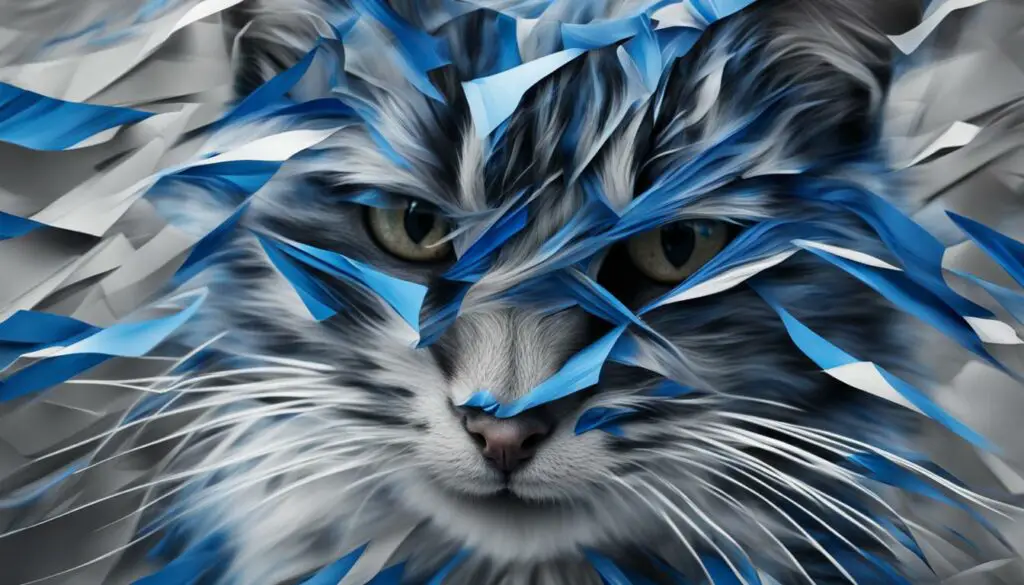
What are the Symptoms of a Cat Concussion?
The symptoms of a cat concussion can vary depending on the severity of the injury. Common signs to watch out for include:
- Loss of consciousness or unresponsiveness
- Seizures
- Trouble walking or loss of coordination
- Vomiting
- Abnormal eye movements
- Changes in pupil size
If you notice any of these symptoms in your cat after a head injury or trauma, it is crucial to seek immediate veterinary care. Prompt diagnosis and treatment can help prevent further complications and improve the chances of a full recovery.
Conclusion
A cat concussion is a serious condition that can result from head trauma. Knowing the signs and symptoms of a concussion in cats can help you identify when immediate veterinary care is needed. By recognizing the importance of timely treatment and providing the necessary care and support, you can help your feline friend recover and ensure their well-being in the long term.
Causes of Cat Concussion
The Importance of Identifying Potential Causes
Cat concussions can occur as a result of various causes, all of which involve head injury or trauma. It is important for cat owners to be aware of these potential causes in order to take preventive measures and reduce the risk of their feline companions experiencing a concussion. Here are some of the main causes of cat concussions:
- Falls from heights: Cats are known for their climbing abilities, but falls from tall structures like trees or balconies can lead to head injuries that result in concussions.
- Being hit by a car: Unfortunately, cats can be involved in accidents with vehicles, leading to head trauma that may cause a concussion.
- Running into objects at high speed: Cats are often playful and energetic, which can sometimes result in collisions with walls, furniture, or other objects that can cause head injuries.
- Mistreatment or abuse: Tragically, some cats may experience mistreatment or abuse that includes head trauma, leading to a potentially severe concussion.
By understanding these causes, cat owners can take proactive steps to create a safe environment for their furry friends and minimize the risk of head injuries.
Illustrative Table: Causes of Cat Concussion
| Cause | Description |
|---|---|
| Falls from heights | Cats falling from tall structures, such as trees or balconies. |
| Being hit by a car | Accidents involving cats and vehicles, resulting in head trauma. |
| Running into objects | Cats colliding with walls, furniture, or other obstacles at high speed. |
| Mistreatment or abuse | Head trauma caused by intentional harm or neglect. |
Table: Causes of Cat Concussion.
Symptoms of Cat Concussion
When a cat experiences head trauma, it is important to be aware of the potential symptoms of a concussion. Recognizing these symptoms can help you seek immediate medical attention for your feline friend. The following are common signs that may indicate a cat concussion:
- Loss of consciousness: Your cat may become unresponsive and appear unconscious for a period of time.
- Unresponsiveness: Your cat may not react to external stimuli or show a lack of interest in their surroundings.
- Seizures: Cats with concussions may experience seizures characterized by uncontrollable shaking or convulsions.
- Trouble walking: Your cat may have difficulty maintaining their balance, stumble, or walk in an uncoordinated manner.
- Vomiting: Concussions can cause nausea and vomiting in cats.
- Abnormal eye movements: Your cat’s eyes may exhibit unusual movements, such as rapid back-and-forth motion or twitching.
- Changes in pupil size: The size of your cat’s pupils may vary, with one appearing larger or smaller than the other.
If your cat displays any of these symptoms following head trauma, it is crucial to seek veterinary care as soon as possible.
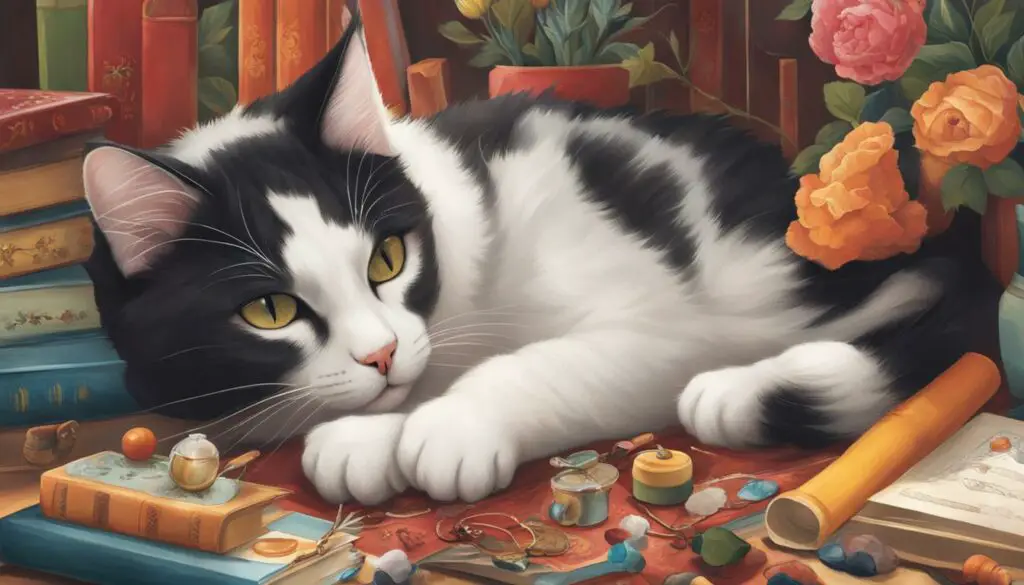
Seeking Immediate Veterinary Care
If you suspect your cat has a concussion, it is crucial to seek immediate veterinary care to ensure their well-being. Delaying treatment can lead to further damage to the brain and potential complications. Contact your veterinarian immediately and explain the situation in detail. They will provide guidance on the next steps to take.
When seeking veterinary care for a cat concussion, it is important to describe the events leading up to the injury, any observed symptoms, and any changes in your cat’s behavior or overall condition. This information will help the veterinarian assess the severity of the concussion and determine the most appropriate course of action.
Upon arrival at the veterinary clinic, the veterinarian will perform a thorough examination of your cat. This may include a neurological assessment to evaluate their reflexes, coordination, and overall brain function. In some cases, imaging tests such as an MRI or CT scan may be recommended to assess the severity of the brain injury.
Based on the examination and test results, the veterinarian will recommend the most suitable treatment plan for your cat. This may include supportive care, such as rest and pain management, or more advanced interventions if necessary. It is important to follow the veterinarian’s instructions closely to ensure the best possible outcome for your cat.
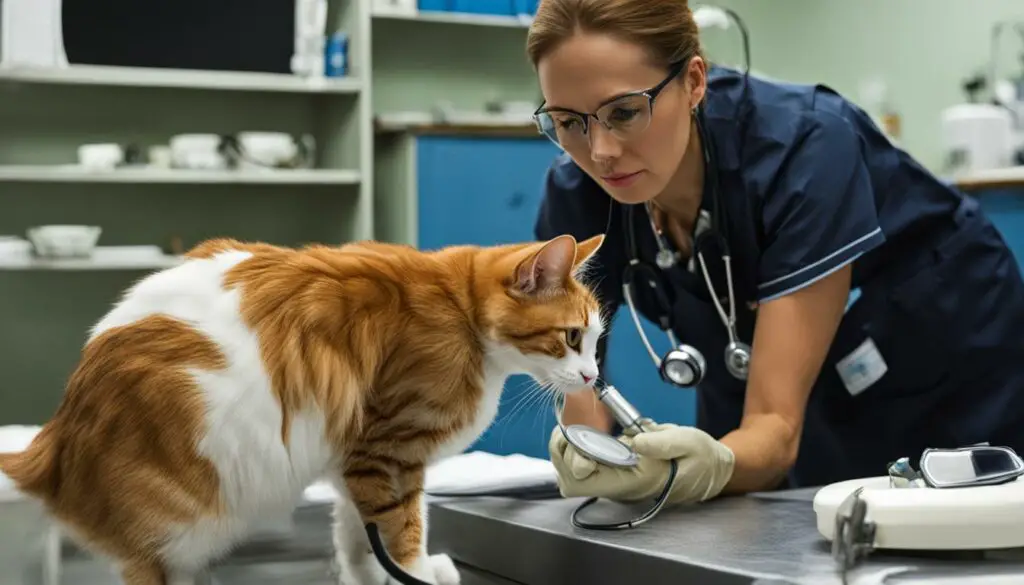
Table: Signs and Symptoms of Cat Concussion
| Signs and Symptoms | Description |
|---|---|
| Loss of consciousness | Temporary loss of awareness and responsiveness. |
| Unresponsiveness | Inability to react or respond to stimuli. |
| Seizures | Uncontrolled, involuntary movements or convulsions. |
| Trouble walking | Unsteady gait or difficulty maintaining balance. |
| Vomiting | Expelling stomach contents forcefully through the mouth. |
| Abnormal eye movements | Jerking or rapid eye movements that are not normal. |
| Changes in pupil size | Unequal or non-reactive pupils. |
To ensure the best possible outcome for your cat, it is essential to seek immediate veterinary care if you suspect a concussion. Remember, your veterinarian is your best resource for diagnosing and treating a cat concussion, so do not hesitate to reach out for professional assistance.
Diagnosis and Treatment Options
When a cat sustains a concussion, a proper diagnosis is essential to determine the severity of the injury and to guide appropriate treatment. The diagnosis of a cat concussion often involves a thorough physical examination by a veterinarian, including an assessment of the cat’s neurological function.
In some cases, additional diagnostic tests may be necessary, such as imaging scans like MRI or CT scans. These tests can provide detailed information about the brain and help identify any structural abnormalities or bleeding that may be present.
Once a concussion is diagnosed, treatment options will depend on the severity of the injury. In milder cases, supportive care may be sufficient. This may include providing a quiet and calm environment for the cat to rest, monitoring their behavior and vital signs, and administering appropriate pain medications, if necessary.
In more severe cases, surgery may be required to relieve pressure on the brain or to repair any damage to the skull. This type of intervention is typically reserved for cases where there is significant swelling or bleeding within the brain. It is important to consult with a veterinarian to determine the best course of action for your cat’s specific situation.
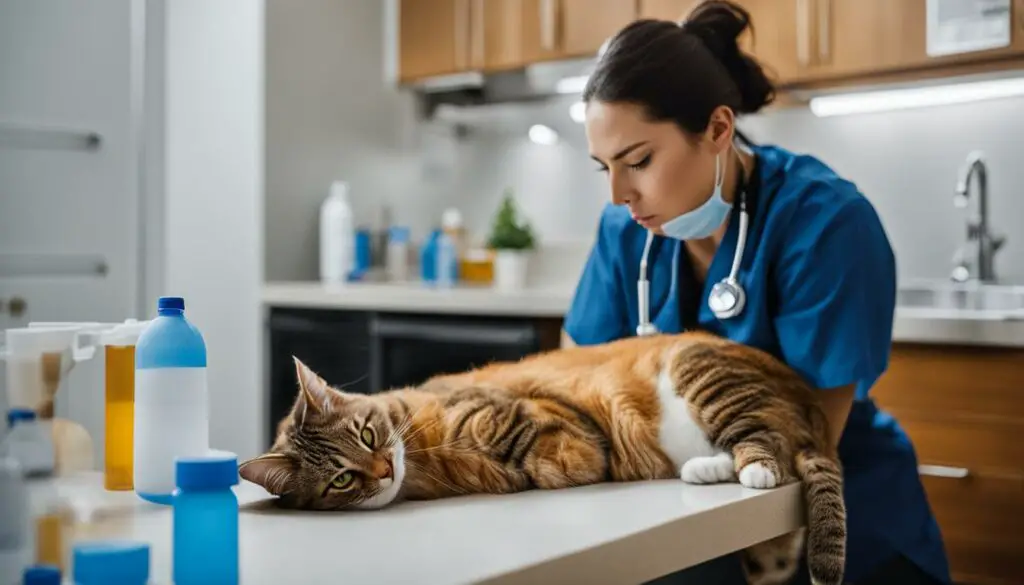
| Diagnosis and Treatment Options for Cat Concussion |
|---|
| Thorough physical examination by a veterinarian |
| Neurological assessment |
| Imaging tests (MRI or CT scans) if necessary |
| Supportive care for milder cases |
| Pain medication, if necessary |
| Surgery for severe cases (to relieve pressure or repair damage) |
It is important to follow the veterinarian’s guidance regarding treatment and to provide ongoing care to ensure the best possible outcome for your cat’s recovery. Regular follow-up visits may be necessary to monitor progress and make any necessary adjustments to the treatment plan.
Long-Term Care and Rehabilitation
When it comes to cat concussions, long-term care and rehabilitation play a crucial role in the recovery process. Cats with concussions may experience lingering symptoms or cognitive deficits that require ongoing support and treatment. It’s important to provide the necessary care to aid in their healing and overall well-being.
One aspect of long-term care is monitoring the cat’s progress. Regular check-ups with a veterinarian can help assess the cat’s condition, track improvements, and address any potential complications that may arise. Monitoring may include blood pressure measurements, laboratory tests, and evaluations to ensure the cat is on the right track towards recovery.
In addition to monitoring, proper nutrition is essential for a cat’s recovery. A well-balanced diet, tailored to the cat’s needs, can support healing and provide the necessary nutrients for optimal brain function. Adequate hydration is also important, as it aids in the body’s natural healing processes.
In some cases, cats may benefit from rehabilitation therapies. This can include physical therapy, which helps improve mobility and coordination, as well as cognitive rehabilitation to address any cognitive deficits. These therapies aim to optimize the cat’s physical and cognitive abilities, promoting a full and successful recovery.
Table: Long-Term Care and Rehabilitation
| Treatment | Description |
|---|---|
| Regular Check-ups | Monitor progress, assess improvements, and address complications |
| Nutrition | Provide a well-balanced diet tailored to the cat’s needs |
| Hydration | Ensure adequate hydration to support the body’s natural healing processes |
| Rehabilitation Therapies | Physical therapy and cognitive rehabilitation to optimize physical and cognitive abilities |
With proper long-term care and rehabilitation, cats with concussions have the opportunity to make a full recovery or experience significant improvement in their overall condition. It’s important to provide the necessary support and treatment to ensure their well-being and quality of life.
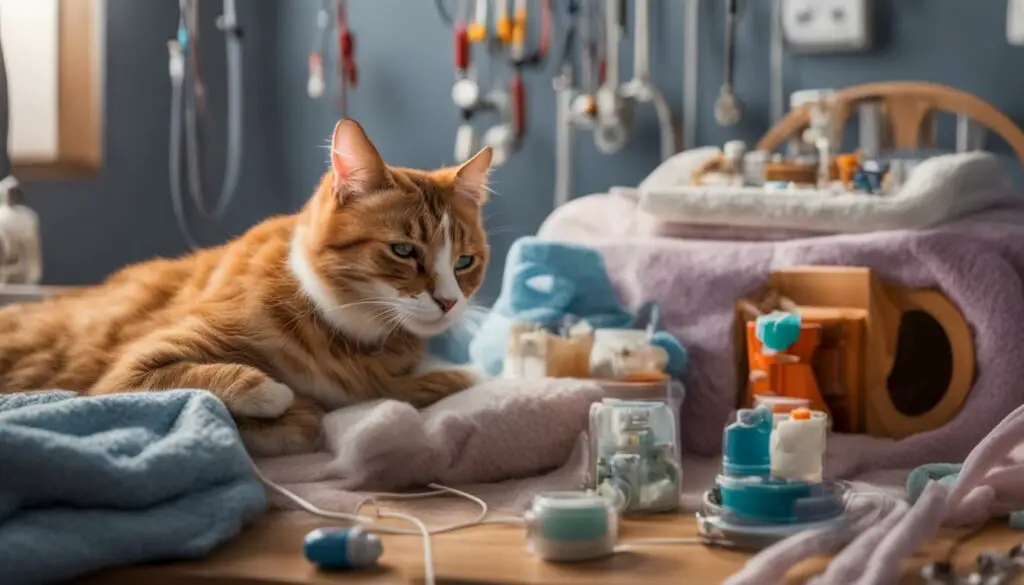
Preventive Measures
When it comes to ensuring the safety and well-being of our furry friends, taking preventive measures is of utmost importance. In the case of cat concussions, there are several steps you can take to minimize the risk of head trauma and related injuries.
Creating a Safe Environment
One of the most effective ways to prevent cat concussions is by creating a safe environment for your feline companion. Ensure that your home is free from potential hazards such as sharp objects, unstable furniture, or open windows. Keep hazardous chemicals and plants out of your cat’s reach, as ingesting or coming into contact with these substances can also pose a danger.
Keeping Cats Indoors
Allowing your cat to roam outdoors may expose them to various risks, including the possibility of traumatic incidents. Keeping your cat indoors can significantly reduce the chances of head trauma caused by falls, car accidents, or altercations with other animals. Creating an enriching indoor environment with toys, scratching posts, and climbing structures can help satisfy your cat’s natural instincts and provide mental stimulation.
Regular Check-ups and Vaccinations
Regular veterinary check-ups and vaccinations are essential for maintaining your cat’s overall health and well-being. By staying up to date with vaccinations, you can protect your cat from certain diseases that may increase the risk of accidents or injuries. Additionally, routine check-ups allow your veterinarian to identify any potential health concerns early on and provide appropriate guidance to prevent accidents or injuries.
| Preventive Measures to Reduce Cat Concussions | Benefits |
|---|---|
| Creating a safe environment | Minimizes the risk of head trauma caused by hazards in the home |
| Keeping cats indoors | Reduces the chances of falls, car accidents, or altercations with other animals |
| Regular check-ups and vaccinations | Ensures overall health and early detection of potential health concerns |
By implementing these preventive measures, you can help safeguard your cat against head trauma and reduce the risk of cat concussions. Remember, the well-being of our feline friends is in our hands, and every effort we make to protect them goes a long way in ensuring their happiness and safety.
Importance of Monitoring and Follow-up Care
After a cat has experienced a concussion, it is crucial to closely monitor their progress and provide the necessary follow-up care. Monitoring allows for the early detection of any complications or changes in their condition. Follow-up care ensures that any ongoing symptoms or issues are addressed promptly, maximizing the chances of a full recovery.
During the monitoring process, regular visits to the veterinarian are essential. These visits may include blood pressure measurements, laboratory tests, and evaluations to assess the cat’s progress. By monitoring vital signs and conducting tests, veterinarians can track the cat’s recovery and make any necessary adjustments to their treatment plan.
Follow-up care also involves providing additional support and interventions as needed. This may include adjustments to the cat’s medication regimen, therapy sessions, or nutritional recommendations. The goal is to ensure that the cat receives comprehensive care tailored to their specific needs, promoting healing and minimizing any long-term effects of the concussion.
The Role of Caregiver Observation
In addition to veterinary monitoring, caregiver observation plays a crucial role in the follow-up care of a cat with a concussion. Caregivers should closely observe the cat’s behavior, looking for any changes or signs of discomfort. These observations can include monitoring the cat’s eating and drinking habits, activity levels, and overall demeanor. Any significant changes should be reported to the veterinarian for further evaluation.
A caregiver’s role in providing a calm and comfortable environment cannot be overstated. Reducing stress and providing a safe space can aid in the cat’s recovery. Ensuring the cat has access to food, water, and a litter box in a quiet area can help create a stress-free environment. Engaging the cat in gentle play and providing mental stimulation, such as puzzle toys or interactive games, can also help support their overall well-being during the recovery process.
In conclusion, monitoring and follow-up care are essential after a cat has experienced a concussion. Regular veterinary visits, caregiver observation, and creating a supportive environment can greatly contribute to the cat’s recovery. Early detection of any complications or changes in the cat’s condition can lead to prompt intervention and improved outcomes. By providing comprehensive follow-up care, caregivers can ensure the best possible outcome for their feline friend.
| Monitoring and Follow-up Care Checklist |
|---|
| Attend regular veterinary visits for blood pressure measurements, laboratory tests, and evaluations. |
| Observe the cat’s behavior for any changes or signs of discomfort. |
| Report any significant changes to the veterinarian for further evaluation. |
| Create a calm and comfortable environment for the cat’s recovery. |
| Ensure the cat has access to food, water, and a litter box in a quiet area. |
| Engage the cat in gentle play and provide mental stimulation. |
Outlook for Cats with Concussion
Recovery from a cat concussion can vary depending on several factors, including the severity of the injury and the promptness and effectiveness of treatment. With the right care and interventions, many cats can experience significant improvement in their overall condition. However, it’s important to note that full recovery may not always be possible.
The duration of recovery can also vary. Some cats may show improvement within a few days or weeks, while others may require months of rehabilitation and support. Patience and consistency are key during this process.
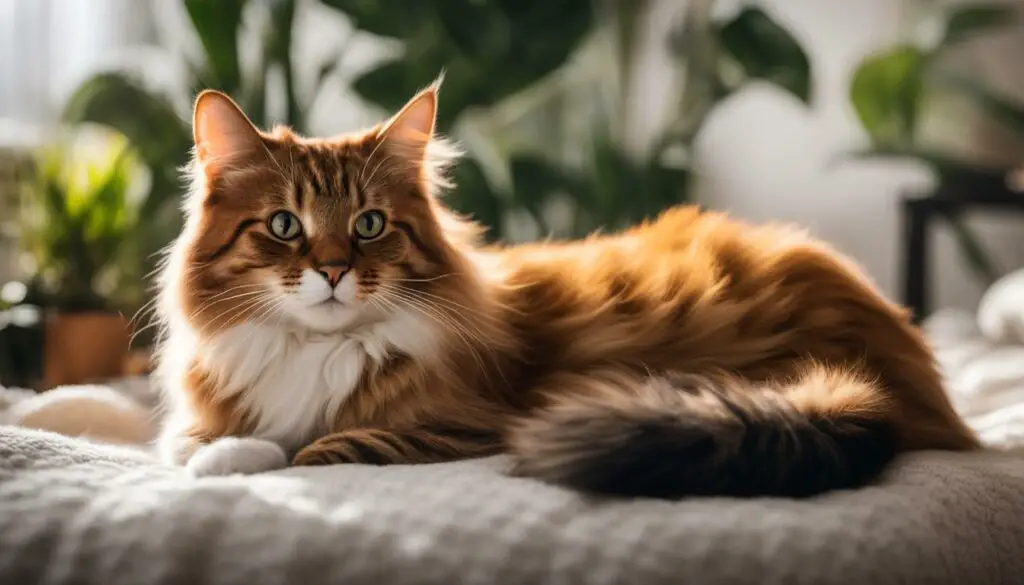
Factors Affecting Recovery
Several factors may influence the long-term outlook for cats with a concussion. The severity of the initial injury plays a significant role, as more severe concussions may result in more extensive damage to the brain. Additionally, the age and overall health of the cat can impact recovery.
The effectiveness of treatment and the support provided by the cat’s caregiver also contribute to the recovery process. Prompt medical attention, proper diagnosis, and appropriate treatment measures can greatly improve the chances of a positive outcome.
| Factors | Impact on Recovery |
|---|---|
| Severity of Injury | Greater severity may result in a more complex recovery. |
| Age and Health of Cat | Younger, healthier cats may have a better chance of recovery. |
| Treatment and Support | Prompt, appropriate care improves the likelihood of a positive outcome. |
During the recovery process, close monitoring and follow-up with a veterinarian are essential. Regular check-ups can help track the cat’s progress, identify any complications, and make necessary adjustments to the treatment plan.
Supporting Cat Concussion Recovery
While every cat’s recovery journey is unique, there are several ways you can support their healing process:
- Provide a quiet and calm environment to minimize stress.
- Ensure they have a comfortable place to rest and recuperate.
- Administer any prescribed medications as directed by the veterinarian.
- Stick to a balanced diet to promote overall health and well-being.
- Engage in gentle play and activities to encourage physical and mental stimulation.
Remember, patience and consistency are key when it comes to supporting a cat’s recovery from a concussion. With the right care and dedication, many cats can regain their quality of life.
The Role of Nutrition and Hydration
Proper nutrition and hydration play a vital role in the recovery of cats with concussions. A well-balanced diet rich in essential nutrients, vitamins, and minerals can support their overall health and aid in the healing process. It is important to provide high-quality cat food that meets their specific dietary needs and is easily digestible.
In addition to nutrition, hydration is equally important for cats with concussions. Ensuring that your feline friend has access to fresh, clean water at all times is crucial. Hydration can promote brain function and help prevent complications such as dehydration or electrolyte imbalances.
When caring for a cat with a concussion, it may be necessary to adjust their diet temporarily. Your veterinarian may recommend specific dietary modifications to accommodate their condition and aid in their recovery. It is essential to follow their guidance and monitor your cat’s eating and drinking habits closely.
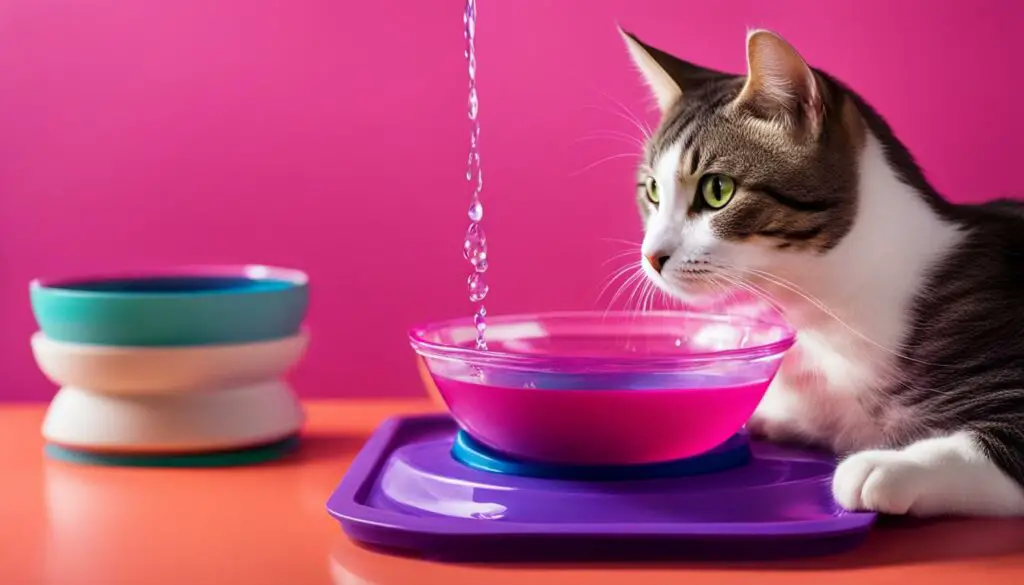
Remember, nutrition and hydration are not only important during the recovery phase but also for the overall well-being of your cat. By providing a balanced diet and ensuring they stay hydrated, you can support their immune system, strengthen their body, and promote optimal health.
Supportive Measures for Cats with Concussions
When it comes to supporting cats with concussions, a multi-faceted approach that includes rehabilitation and therapy can greatly aid in their recovery. These supportive measures aim to address not only the physical symptoms but also the cognitive and behavioral aspects affected by the injury.
Physical Rehabilitation:
Cats with concussions may experience difficulty with coordination, balance, and mobility. Physical rehabilitation exercises can help improve muscle strength and coordination, aiding in their overall recovery. These exercises may include gentle stretching, balance exercises, and walking on different surfaces to help regain their motor skills. A professional veterinarian or veterinary physiotherapist can provide guidance on the appropriate exercises for your cat’s specific needs.
Cognitive Rehabilitation:
Concussions can also affect a cat’s cognitive function, resulting in memory issues, confusion, and difficulty with problem-solving. Cognitive rehabilitation techniques, such as puzzle toys and interactive games, can help stimulate the brain and improve cognitive abilities. These activities provide mental stimulation and encourage the use of problem-solving skills, supporting the recovery of your cat’s cognitive function.
Behavioral Therapy:
Some cats with concussions may exhibit changes in behavior, such as increased anxiety, aggression, or fearfulness. Behavioral therapy, conducted by a professional veterinarian or animal behaviorist, can help address these issues. This may involve creating a calm environment, implementing positive reinforcement techniques, and providing appropriate outlets for physical and mental stimulation. The goal is to help your cat feel safe and secure, reducing any stress or anxiety they may be experiencing.
By employing these supportive measures, you can provide comprehensive care for cats with concussions, helping them recover and regain their quality of life. It’s important to consult with a veterinarian who specializes in feline care to create a personalized rehabilitation plan tailored to your cat’s specific needs.
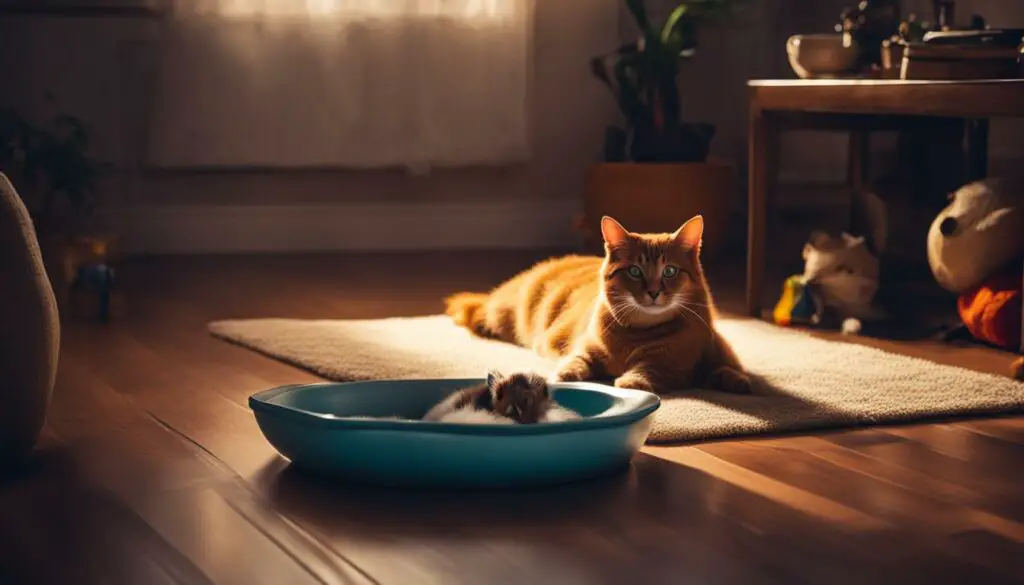
Mental and Emotional Support
Cats with concussions may experience mental and emotional challenges during their recovery process. These challenges can manifest in various ways, including mood swings, anxiety, and depression. It is important to provide a calm and comforting environment for your cat, as this can help alleviate their stress and promote emotional well-being.
One way to support your cat’s mental and emotional health is by engaging them in activities that they enjoy. Playtime with interactive toys, gentle petting, and providing a safe and secure hiding place can all help reduce anxiety and promote a sense of security. Additionally, maintaining a consistent routine and providing a quiet space for your cat to rest can also be beneficial.
If you notice any significant changes in your cat’s behavior or mood, it is important to consult with your veterinarian. They can provide guidance and recommend potential interventions, such as behavioral therapy or medication, to help address any mental and emotional challenges your cat may be experiencing.
Key Takeaways:
- Cats with concussions may experience mental and emotional challenges.
- Providing a calm and comforting environment can help alleviate stress and promote emotional well-being.
- Engaging your cat in activities they enjoy can reduce anxiety and promote a sense of security.
- If significant changes in behavior or mood occur, consult with a veterinarian for guidance and potential interventions.
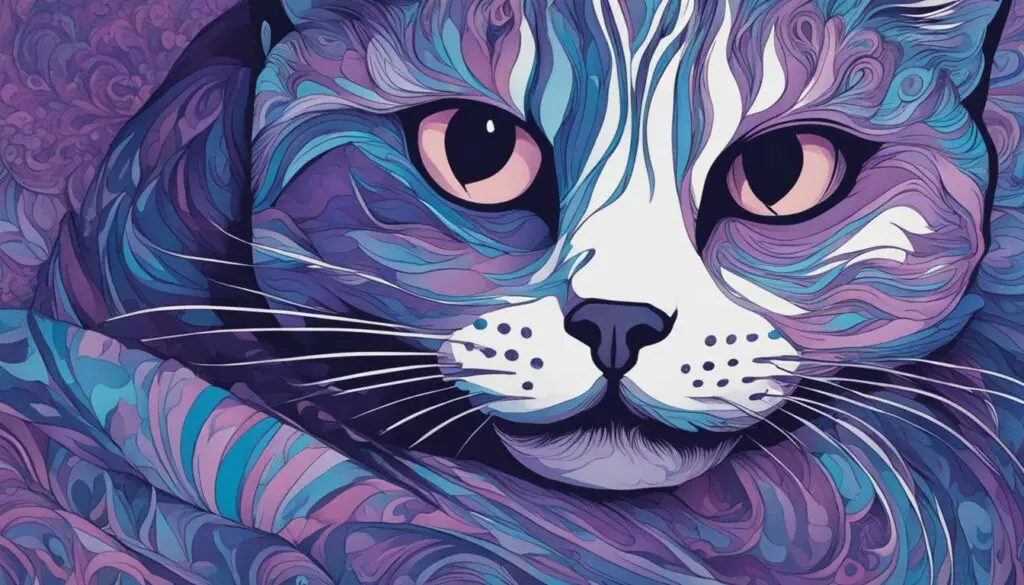
| Mental and Emotional Support Tips: |
|---|
| 1. Create a calm and comforting environment for your cat. |
| 2. Engage your cat in activities they enjoy. |
| 3. Maintain a consistent routine and provide a quiet resting space. |
| 4. Monitor for significant changes in behavior or mood and consult a veterinarian if needed. |
Conclusion
In summary, cat concussions are a serious condition that require immediate veterinary care. Understanding the symptoms, seeking prompt medical attention, and providing proper care and support are crucial for a positive outcome. By recognizing the causes, symptoms, treatment options, and preventive measures, you can play an active role in ensuring the well-being of your feline friend.
When it comes to cat concussions, early intervention is key. If you suspect your cat has a concussion, don’t wait. Contact your veterinarian right away and explain the situation. Delaying treatment can lead to further brain damage and potential complications.
Throughout the recovery process, it’s important to monitor your cat’s progress and provide necessary follow-up care. Regular visits to the veterinarian, along with proper nutrition and hydration, can support healing and overall well-being. Additionally, consider implementing supportive measures, such as rehabilitation therapies and mental/emotional support, to aid in your cat’s recovery.
While the long-term outlook for cats with concussions can vary, many can fully recover or experience significant improvement with proper care and timely intervention. Remember, the health and well-being of your furry companion should always be a top priority.
FAQ
What is a cat concussion?
A cat concussion is a type of brain injury that can occur as a result of head trauma.
What are the causes of cat concussions?
Cat concussions can be caused by various factors, including falls from heights, being hit by a car, running into objects at high speed, and even mistreatment or abuse.
What are the symptoms of a cat concussion?
The symptoms of a cat concussion may include loss of consciousness, unresponsiveness, seizures, trouble walking, vomiting, abnormal eye movements, and changes in pupil size.
What should I do if I suspect my cat has a concussion?
If you suspect your cat has a concussion, it is important to seek immediate veterinary care. Call your veterinarian and explain the situation to ensure prompt medical attention for your cat.
How is a cat concussion diagnosed and treated?
Proper diagnosis of a cat concussion may involve a thorough physical examination, neurological assessment, and possibly imaging tests such as MRI or CT scans. Treatment options may include supportive care, medication for pain management, and, in severe cases, surgery.
What is the long-term care and rehabilitation for cats with concussions?
Cats with concussions may require long-term care and rehabilitation, which may include monitoring their progress, ensuring adequate nutrition, and providing necessary medications or therapies to address any lingering symptoms or cognitive deficits.
How can I prevent cat concussions?
Taking preventive measures such as keeping cats indoors, protecting them from potential hazards, and providing a safe, stimulating environment can minimize the chances of head trauma and related injuries.
Why is monitoring and follow-up care important for cats with concussions?
Monitoring your cat’s recovery and providing necessary follow-up care is crucial to assess progress, address any complications, and ensure the best possible outcome.
What is the outlook for cats with concussions?
The long-term outlook for cats with a concussion depends on various factors, such as the severity of the injury and the effectiveness of treatment. With proper care and timely intervention, many cats can recover fully or experience significant improvement in their overall condition.
How does nutrition and hydration play a role in cat concussion recovery?
Proper nutrition and hydration are essential for the recovery of cats with concussions. Adequate hydration and a well-balanced diet can support healing and overall well-being.
What supportive measures are recommended for cats with concussions?
Supportive measures, such as cognitive rehabilitation, speech therapy, occupational therapy, and physical therapy, may be recommended for cats with concussions to aid in their recovery.
How can I provide mental and emotional support for my cat with a concussion?
Cats with concussions may experience mental and emotional challenges, such as mood swings, anxiety, and depression. Providing a calm and comforting environment, along with engaging activities, can help support their emotional well-being.
Source Links
- https://www.hillspet.com/cat-care/healthcare/can-cats-get-concussions
- https://vcahospitals.com/know-your-pet/brain-injury-in-cats
- https://petmd.com/cat/emergency/accidents-injuries/can-cats-get-concussions







